Novel Polymer Composite Heat Exchanger for Dry Cool Power Plants
David Hymas, Gargi Kailkhura, Dr. Martinus Arie, Dr. Farah Singer, Dr. Amir Shooshtari, Dr. Michael Ohadi, Dr. Hugh Bruck
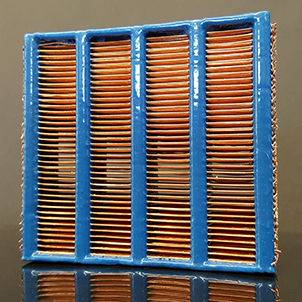
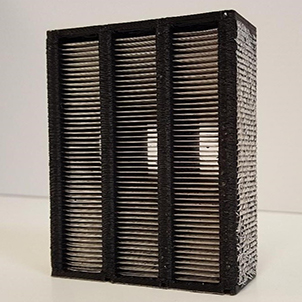
This project focuses on utilizing a newly developed form of additive manufacturing that is capable of produce high performance, lightweight heat exchangers out of readily available polymers and metals. This significantly reduces the amount of labor required to produce heat exchangers while also reducing the cost of the materials involved. Through continued development of the Metal Fiber Composite printing process and utilization of advanced materials, the team hopes to extend these capabilities to a wide range of applications including waste heat recover and electronics cooling.
Advanced Hybrid Heat Exchangers for Aerospace High Temperature Application
Fabio Battaglia, Xiang Zhang, Dr. Martinus Arie, Dr. Amir Shooshtari, Dr. Michael Ohadi
Fabio’s and Xiang’s current research is to take advantage of metal additive manufacturing technology to fabricate Inconel heat exchanger utilizing UMD’s patented manifold-microchannel technology for aerospace application. The 3D printed Inconel 718 heat exchanger prototype has been tested under high temperature conditions (600 C and 4.5 Bar on hot side, 40 C and 1 Bar on cold side). The decent agreement between the experimental and the numerical results demonstrates that the numerical analysis for heat transfer and pressure drop in the heat exchanger can accurately predict the additively manufactured manifold-microchannel heat exchanger’s performance.
High-Temperature Heat Exchanger Test Facility
The project objective is to develop an advanced high-performance heat exchanger (HX) for dry cooling application using direct metal laser sintering (DMLS) and manifold-microchannel concept. The heat exchanger is consist of manifold-microchannels in the air-side and rectangular channels in the water-side. Multiples manifold-microchannel HXs prototypes were successfully fabricated out of multiple different materials including:
- 6 x 4.5 x 2.5 cm3 – 120W out Stainless-steel 17-4, Titanium alloy (Ti64), and Aluminum alloy (AlSi10Mg)
- 15 x 15 x 3.2 cm3 – 1kW HXs out Ti64
- 7 x 7 x 3.5 cm3 – 240W HXs out Maraging Steel
Compared to the performance of state-of-the-art commercial plate fins HXs, up to 100% improvement in heat transfer coefficient was observed.
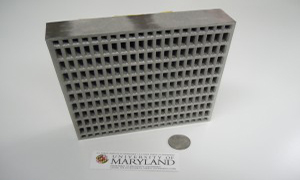
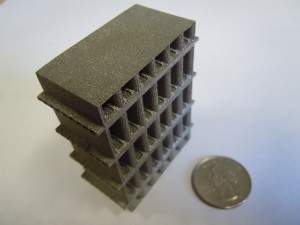
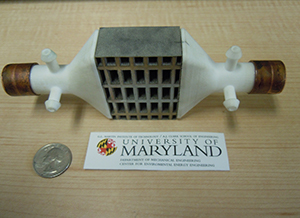
UMD had developed a multi-objective optimization interface for designing and sizing of heat exchangers. The interface is applicable for conventional heat exchangers such as plate fins heat exchangers, plate heat exchangers, tube and fins heat exchangers, and also novel heat exchangers such as manifold-microchannel heat exchangers. The optimization interface is used to find the heat exchanger design with the highest performance while still meeting both the geometrical and performance constraints.
Thermal Management and Packaging of High Power DC-DC Converters
AdSevket Umut Yuruker, Raphael Mandel, Michael Ohadid
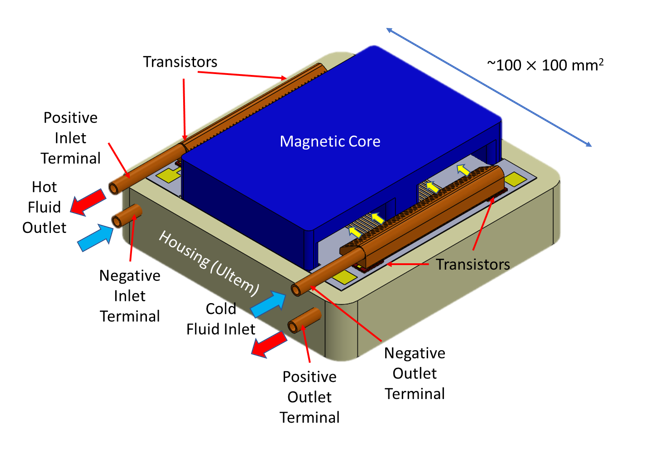
This project focuses on developing an innovative cooling system with a feasible packaging configuration for high power, variable voltage DC-DC converter modules. The goals of the project is to significantly reduce the size of the commercially available converter modules (x20) and provide sufficient cooling for the high frequency (~500 kHz- 1MHz) switches, transformer wingdings and the magnetic core. A novel 3D printable metal manifold micro-channel module, which double functions as the cooler and electrical terminals for the high frequency transistors, is under development to be integrated with the systems to remediate the significantly elevated heat fluxes due to reduction in size and increase in operating frequency.
Embedded Cooling of High Flux Electronics via Micro-enabled Surfaces and fluid Delivery System
Raphael Mandel, Daniel Bae, Serguei Dessiatoun, Amir Shooshtari, Michael Ohadi
The rapid increase in heat dissipation of next-generation integrated circuits requires superior and more elaborate cooling methods. This project introduced a unique heat sink called the thin-Film Evaporation and Enhanced Delivery System (FEEDS), which numerically and experimentally demonstrated remarkable cooling capabilities above 1 kW/cm2. This approach significantly reduced thermal resistance between the electronic junction and the heat sink through the use of embedded fins, evaporation, and unique fluid delivery system.
Two-phase flow regimes and Heat Transfer in a manifolded-microgap
David Deisenroth, Avram Bar-Cohen, Amir Shooshtari, Michael Ohadi
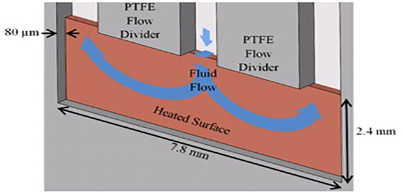
Develop phenomenological insights into the interplay between two-phase flow and local heat transfer rates in high heat flux manifold-microchannel electronics coolers. Establish the relationships between thin-film evaporation and heat transfer degradation at high quality. Compare results with previous studies to compactly characterize performance.
Self-Cleaning Microchannel Reactor
Stefan Bangerth, Serguei Dessiatoun, Amir Shooshtari, Michael Ohadi
Micro-structure surfaces are known for their potential to enhance absorption processes, e.g. in absorption refrigeration or gas cleaning applications. One of the main hurdles to more widespread usage of the technology is its sensitivity to clogging and fouling. The S2TS Laboratory aims to address this obstacle by implementing an innovative self-cleaning mechanism into the reactor. Additionally, the reactor’s high stability design will allow to gather data on absorption using micro-channels under elevated pressure conditions.
Next Generation Mass Exchanger
Ratnesh Tiwari, Serguei Dessiatoun, Amir Shooshtari, Michael Ohadi
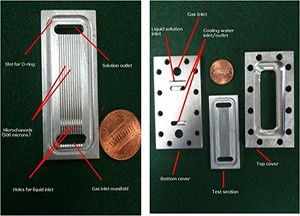
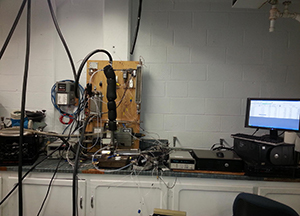
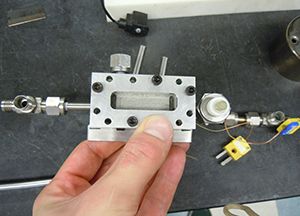
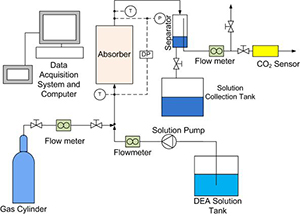
Through his PhD research, blended with his industrial experience, Ratnesh aims to demonstrate the next generation mass exchanger to be used for several leading industrial processes such as CO2 capture, NH3 absorption. His current research focus is to apply micro-channel technology to refrigeration and oil and gas industrial processes by means of [process intensification that would lead to miniaturization of heat and mass exchanger equipment in the current industrial processes.
Past Projects
Enchanced Cooling System for Power Electronics
Fabio Battaglia, Serguei Dessiatoun, Michael Ohadi
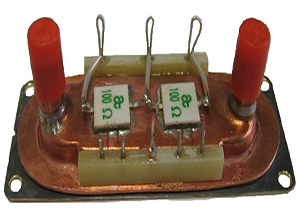
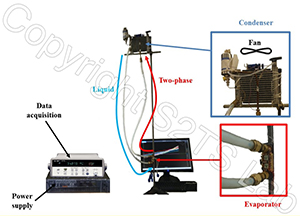
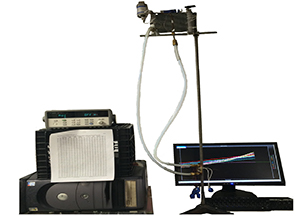
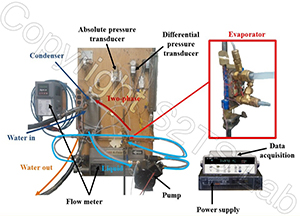
The goal of this project is to maintain the temperatures of the electronic devices below dangerous values while increasing the heat flux as much as possible. A heat sink is designed and produced in the S2TS lab. It is combined to a pump less loop charged with dielectric refrigerant for cooling the resistances attached from the high heat flux provided. The same heat sink is also tested in a pump driven loop. In this application, the cooling capacity is increased due to the increased flow rate of the refrigerant.
Electrostatic Based Droplet Separation System
Ning Yang, Serguei Dessiatoun, Amir Shooshtari, Michael Ohadi
Ning’s research focus is to develop a highly efficient, electrostatic based droplets separation system. This innovative technology could find potential applications in a variety of air-conditioning and refrigeration applications.
Velocity Based Droplet Defrost Control
Kamalakkannan Muthusubramanian, Alex Verovsky, Serguei Dessiatoun, Amir Shooshtari, Michael Ohadi
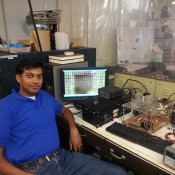
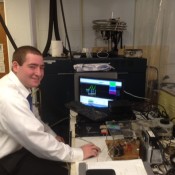
The purpose of this project is to find more efficient and effective ways of controlling crystal frost growth on external heat surfaces (heat exchangers). The direction and time duration of airflow are being optimized to complete defrost with the least expenditure of energy. They are also investigating the possibility of using higher air velocities to retard frost formation during the heating cycle of the heat pump.
Other past projects:
- Enhanced Cooling System for Power Electronics
- Performance characterization of micro-scale condensers
- Development of forced-feed micro channel evaporators and condensers for cooling of high flux electronics
- Structural and mechanical design analysis of advanced micro-channel heat exchangers
- Sand fouling of heat exchangers
- Development of MEMS-based Micro-pump
- EHD-enhanced in-tube and external boiling of alternate refrigerants/refrigerant mixture
- EHD-enhanced in-tube and external condensation of alternate refrigerants/refrigerant mixtures
- EHD-enhanced air-side heat transfer
- Applicability of EHD to heat transfer enhancement in highly compact heat exchangers
- EHD heat transfer enhancement in mini and microchannels
- Control of frost formation on cold surfaces/coils using the EHD technique
- Prototyping of an EHD-enhanced direct expansion evaporator
- Prototyping of an EHD-enhanced condenser
- Liquid-vapor separation and flow management using EHD technique
- Electrode materials, design, and fabrication
- EHD-enhanced thin film evaporation
- Electrostatic (EHD)-Enhanced separation of liquid droplets from gas/liquid flows-Application to refrigeration and other systems
- Micro and Macro-scale Electrohydrodynamic (EHD) Enhancement of Thin-film Evaporation
- A Self-Contained System for Thermal Management of Next Generation Radars and Solid-State Lasers
- Air-cooling of phased-array radar systems using low-profile, micro-groove heat sinks
- Super-Compact Two-Phase Loop for Electronics Cooling and other High Heat Flux Applications
- Self-Contained Cold Plate
- High Heat Flux Electronics Cooling
- Force Fed Evaporation
- Force Fed Heat Sinks for High Heat Flux Cooling
- Forced-Fed Heat Transfer for Ocean Thermal Energy Conversion
- Force Fed Heat Transfer for High Performance Electronics Cooling
- Forced-Fed Micro Channel Heat Transfer for High Heat Flux Cooling
- Force Fed Microchannel High Heat Flux Cooling Utilizing Microgrooved Surfaces
- A Self-Contained Two-Phase System for Thermal Management of High Heat flux Electronics
- Novel Heat Exchangers: Pathways to New Levels of Efficiency
- Development of a High COP, Waste Heat-driven Refrigeration System Utilizing Advanced Microchannel Heat Exchangers
- Thin Film Evaporation on Microgrooved Surfaces: Application to High Flux Cooling
- Thin Film Evaporation on Microstructured Surfaces
- Next Generation Thin Film Heat Exchangers
- Microstructured Surface Heat Exchanger and Heat Sink
- Direct Cooling of Server CPUs in Data Centers
- Heat Pump Frost Inhibition
- High Heat Flux Thermal Management of Aircraft Avionics
- High-performance Cooling of Next Gen Power Electronics
